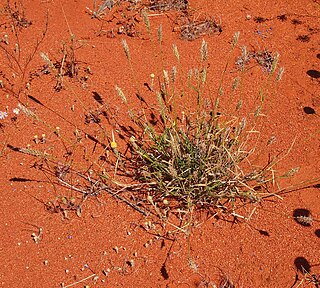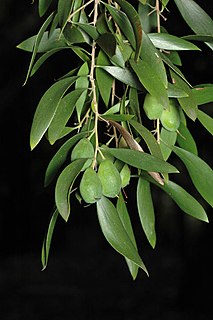
Panicum (panicgrass) is a large genus of about 450 species of grasses native throughout the tropical regions of the world, with a few species extending into the northern temperate zone. They are often large, annual or perennial grasses, growing to 1–3 m tall.

Exocarpos is a genus of flowering shrubs and small trees in the sandalwood family, Santalaceae. They are found throughout Southeast Asia, Australia and the Pacific Islands.

Lepturus is a genus of plants in the grass family, native to Asia, Africa, Australia, and various islands in the Indian and Pacific Oceans.

Setaria is a widespread genus of plants in the grass family.

Trachymene is a genus of herbs in the family Araliaceae. The species are native to Australia, Malesia, New Caledonia and Fiji.

Rostraria is a genus of plants in the grass family, native primarily to Eurasia and North Africa with one species native to South America. Hairgrass is a common name.

The flora of Australia comprises a vast assemblage of plant species estimated to over 20,000 vascular and 14,000 non-vascular plants, 250,000 species of fungi and over 3,000 lichens. The flora has strong affinities with the flora of Gondwana, and below the family level has a highly endemic angiosperm flora whose diversity was shaped by the effects of continental drift and climate change since the Cretaceous. Prominent features of the Australian flora are adaptations to aridity and fire which include scleromorphy and serotiny. These adaptations are common in species from the large and well-known families Proteaceae (Banksia), Myrtaceae, and Fabaceae.

Yakirra is a genus of Burmese and Australian plants in the grass family.

Eriachne is a genus of plants in the grass family. Most of the species are found only in Australia, with the ranges of a few extending northward into New Guinea, parts of Asia, and Micronesia.
Arthragrostis is a genus of Australian plants in the grass family, found only in Queensland.

Thyridolepis is a genus of Australian plants in the grass family.
Ectrosia is a genus of Asian, Australian, and Pacific Island plants in the grass family.

Iseilema, commonly known in Australia as Flinders grass, is a genus of Asian and Australian plants in the grass family.
Triumfetta clementii is a shrub species that occurs in the north-west of Western Australia. It has an erect, spreading habit, growing to between 0.15 and 0.6 metres high. Yellow flowers appear between May and October in the species' native range.
Cynanchum elegans, the white-flowered wax plant, is a plant species in the genus Cynanchum found in New South Wales in Australia. It is a threatened species.

Acacia argyrodendron, known colloquially as black gidyea or blackwood, is a species of Acacia native to Australia. Czech botanist Karel Domin described this species in 1926 and it still bears its original name. Domin reported collecting the type specimen from somewhere between Camooweal and Burketown in northwestern Queensland, though it is more likely to have been northeast of Aramac.

Sclerolaena is a genus of annuals or short-lived perennials in the family Chenopodiaceae, which are included in Amaranthaceae according to the APG classification.

Persoonia amaliae is a species of flowering plant in the family Proteaceae and is endemic to Queensland. It is a shrub or small tree with hairy young branches, spatula-shaped to lance-shaped leaves and yellow flowers in groups of up to eleven.

Panicum simile, known by the common name two colour panic, is a species of grass found in eastern Australia. It was described by Karel Domin in 1915.

Aristida calycina, commonly known as dark wiregrass, is a species of grass in the family Poaceae that is native in Australia.















